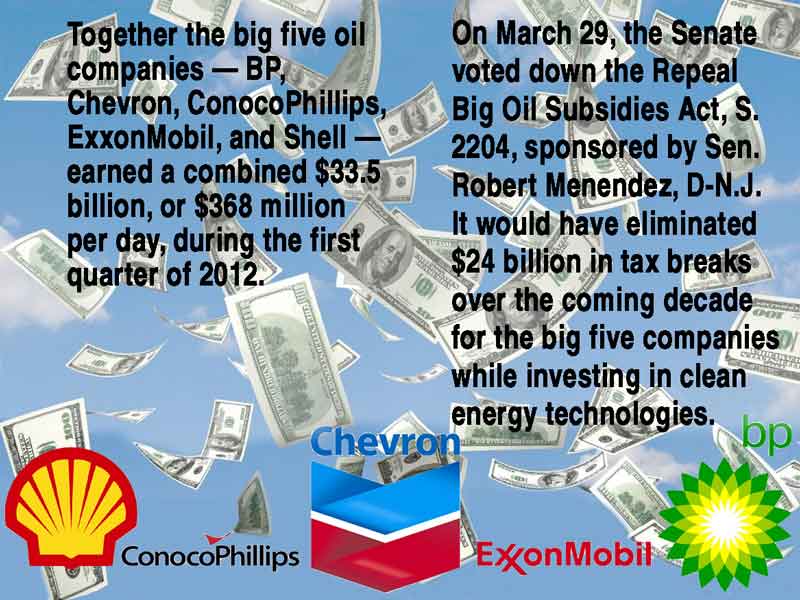A perfect storm is happening with gasoline in our country.
First, gas prices are getting so high that many Americans can no longer afford to drive to work, and yet oil/gas companies are making record profits and receiving huge tax breaks.
And secondly, climate change, caused largely by burning oil and gas, is becoming more of a drain on our economy.
Is there evidence of climate change? Our military thinks so. On April 1, Adm. Mike Mullen, chairman of the U.S. Joint Chiefs of Staff, in the Rostov Lecture at Johns Hopkins University’s School of Advanced International Studies, explained why we are devoting tax dollars to prepare for international disruption caused by climate change:
“Glaciers are melting at a faster rate, causing water supplies to diminish in Asia. Rising sea levels could lead to a mass migration and displacement similar to what we saw in Pakistan’s floods last year. And other shifts could reduce the arable land needed to feed a growing population in Africa. … Scarcity of water, food and space could create not only a humanitarian crisis, but create conditions that could lead to failed states, instability and, potentially, radicalization.”
How do oil and gas fit in? We are giving billions of dollars in tax breaks to the big oil companies, which are making more profit than ever (more than $1 trillion in profits in the last decade).
Our tax write-offs subsidize the fossil fuel industry at nearly 6 times the rate of renewal energy. And we are giving these tax breaks to oil companies at a time when Congress can’t come up with enough money to get our economy going again, without deficit spending that sets us up for more economic trouble in the future.
The perfect storm: Oil and gas are the common themes in this perfect storm. We already have tapped the oil that is easy to drill for, and developing countries want an increasing share of the earth’s oil, and this is driving oil and gas prices up. And burning these fuels makes carbon dioxide, which traps heat in the air when sunlight hits it. This is the biggest cause of climate change that we can do something about.
Unfortunately, politicians jump on the increasing demand for oil and gas to advocate for more risky oil development. They want to drill for oil at the bottom of deep oceans, where oil spills are so hard to contain. They want to tap low quality fossil fuels like tar sands, which are much more expensive to extract than oil and would push up prices at the pump even further.
The Senate recently voted to extend more tax breaks and more permits for drilling and pipelines, which will give us more gas, at more expensive prices, with more climate change.
We could, however, choose a much cheaper and easier alternative, involving two steps.
First, we could pass the recently introduced, End Polluter Welfare Act, which would end our giveaways to oil companies. Congress has not acted on this, and the bill goes up another $30 million every day they delay.
Ending federal subsidies to the fossil fuel industry would be a huge step toward balancing our budget, but it will be hard to enact politically. On March 29, 49 senators voted to keep subsidies for oil companies.
They had received nearly $26 million in political contributions from Big Oil, and since the Supreme Court has removed all limitations on how much corporations can contribute, the oil industry’s political power will just grow larger.
The second step involves cutting our oil and gas use by 50 percent. Developing “green energy” sources is expensive and will take decades, so we can’t depend on wind or solar energy to power our way to decreased fossil fuel use.
A rapid increase in efficiency and conservation of our energy use, however, is possible and affordable.
A decrease in fossil fuel use of 50 percent is doable, if both our government and us, as citizens, would get on board. Americans use twice as much energy as Europeans, so it is possible to reduce our fossil fuel use and still have a comfortable life style.
Our politicians are not going to switch their allegiance from Big Oil to supporting energy conservation and “green energy” development unless we make ourselves heard. To do that, we need to vote only for politicians who place the needs of all Americans above the needs of the fossil fuel industry.
We can make democracy work here, and take a path that protects our children’s future, but it will take a great effort to turn our nation toward this new path.
Richard Thomas of Waterville has a Ph.D. in psychology and has studied the issues of peak oil and climate change for the past 10 years through courses on climate science.
Copy the Story LinkSend questions/comments to the editors.



Success. Please wait for the page to reload. If the page does not reload within 5 seconds, please refresh the page.
Enter your email and password to access comments.
Hi, to comment on stories you must . This profile is in addition to your subscription and website login.
Already have a commenting profile? .
Invalid username/password.
Please check your email to confirm and complete your registration.
Only subscribers are eligible to post comments. Please subscribe or login first for digital access. Here’s why.
Use the form below to reset your password. When you've submitted your account email, we will send an email with a reset code.